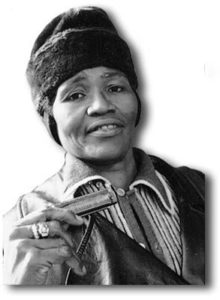Elvis Presley has been accused of cultural appropriation. Whether you believe that or not, there is no doubt that one of his breakthrough singles was a song called “Hound Dog” that he released in 1956. The thing is, the original version of the same song had been a hit, albeit a smaller one, for Big Mama Thornton three years earlier. But it’s not that simple because “Hound Dog” was written by Jerry Lieber and Mike Stoller, two white songwriters. It’s probably fair to say that many people who bought the Presley single, and those who have loved it over the years, were not even aware of the Thornton original. That’s a shame because it’s a brilliant record.
Willie Mae Thornton was born in Alabama and she grew up singing in the church where her father was the minister. She left home at 14 and joined Sammy Green’s Hot Harlem Revue which billed her as the “new Bessie Smith.” It was an accolade that Thornton must have appreciated since Smith was one of her vocal inspirations, along with Memphis Minnie. Thornton moved to Houston in 1948. It was a key move in her career because the Texas city had become a hotbed for a new blues sound that included jump rhythms and horn section. Three years into her time in Houston, Thornton signed with Peacock Records and made her first appearance at New York’s fabled Apollo Theater.
Johnny Otis was on the Peacock roster at the time and Thornton’s collaboration with him led to the recording of “Hound Dog” in 1952. Lieber and Stoller produced the record and Otis played drums. The record was released in February 1953 and raced to the #1 spot on the R&B chart where it remained for seven weeks. “Big Mama” (a nickname given to her by Apollo Theater manager Frank Schiffman in recognition of her big voice, her outsized personality, and her large stature) Thornton became a star on the back of the “Hound Dog” recording but things being what they were in those days, she didn’t see much money from it.
Johnny Ace was another star in the Peacock galaxy. On Christmas day in 1954, Thornton was in his dressing room watching as Ace played with a pistol. Things turned tragic when Ace accidentally shot himself with the pistol and died.
Thornton stayed with Peacock until 1957. During that time, Presley released his version of “Hound Dog” and his version far surpassed Thornton’s in terms of sales. With her career fading in the late ’50s, Thornton decamped to San Francisco where she played the clubs and recorded for several labels. Her 1965 tour in Europe was a big deal because very few female blues singers had been successful there. It was in London that year that Thornton recorded her Arhoolie Records album Big Mama Thornton — In Europe. Her backing musicians for the sessions included Buddy Guy, Fred McDowell, and Walter Horton.

A year later, Arhoolie released a second Thornton album, Big Mama Thornton with the Muddy Waters Blues Band. This time she was backed by Waters himself along with James Cotton, Otis Spann, and other members of the Waters band. Thornton’s third Arhoolie album included Thornton’s recording of her own composition, “Ball ‘n’ Chain.” She had recorded the song a few years earlier for a small label called Bay-Tone. That label never released the recording but did retain the copyright to it. And so it was when Janis Joplin sang “Ball ‘n’ Chain” at the Monterey Pop Festival and recorded it with Big Brother and the Holding Company for the Cheap Thrills album, Thornton did not see any of the enormous publishing royalties that resulted.
The Joplin recording did revive interest in Thornton’s career largely because Joplin herself hired Thornton as her opening act as a means of repaying her. In 1969 she signed with Mercury Records where she released her biggest album, Stronger Than Dirt. But it wasn’t until she got to Pentagram Records that Thornton realized her long-held dream of recording a gospel album. The album Saved includes classics of the genre like “Oh, Happy Day,” “Down By The Riverside,” and “Glory, Glory Hallelujah.”
Eventually, the blues revival faded as musicians who were inspired by the original blues pioneers filled stadiums while the pioneers themselves scuffled to work. Thornton turned to Europe again and her tour there, which included T-Bone Walker, Big Joe Williams, and Eddie Boyd, once again proved gratifying.
The dawn of the 1970s saw Thornton’s health begin to falter as the years of drinking took their toll. There was a serious car accident but Thornton recovered in time to play the Newport Jazz Festival alongside B.B. King, Muddy Waters, and Eddie “Cleanhead” Vinson.” A recording of their set was released on Buddah Records as The Blues — A Summit Meeting. Thornton continued to tour throughout the U.S. and Canada becoming a popular attraction at blues festivals.
Big Mama Thornton died in a Los Angeles boarding house in 1984. The years of alcohol abuse had terminally damaged her heart and liver and at the time of her death, she weighed only 95 pounds. That same year, Thornton was inducted into the Blues Hall of Fame. Although the Rock Roll Hall of Fame has included “Ball ‘n’ Chain” in their list of 500 Songs That Shaped Rock and Roll, the Hall has not yet seen fit to induct Thornton herself. It’s an omission that should be rectified soon.
[embedyt] https://www.youtube.com/watch?v=yoHDrzw-RPg[/embedyt]




Comments